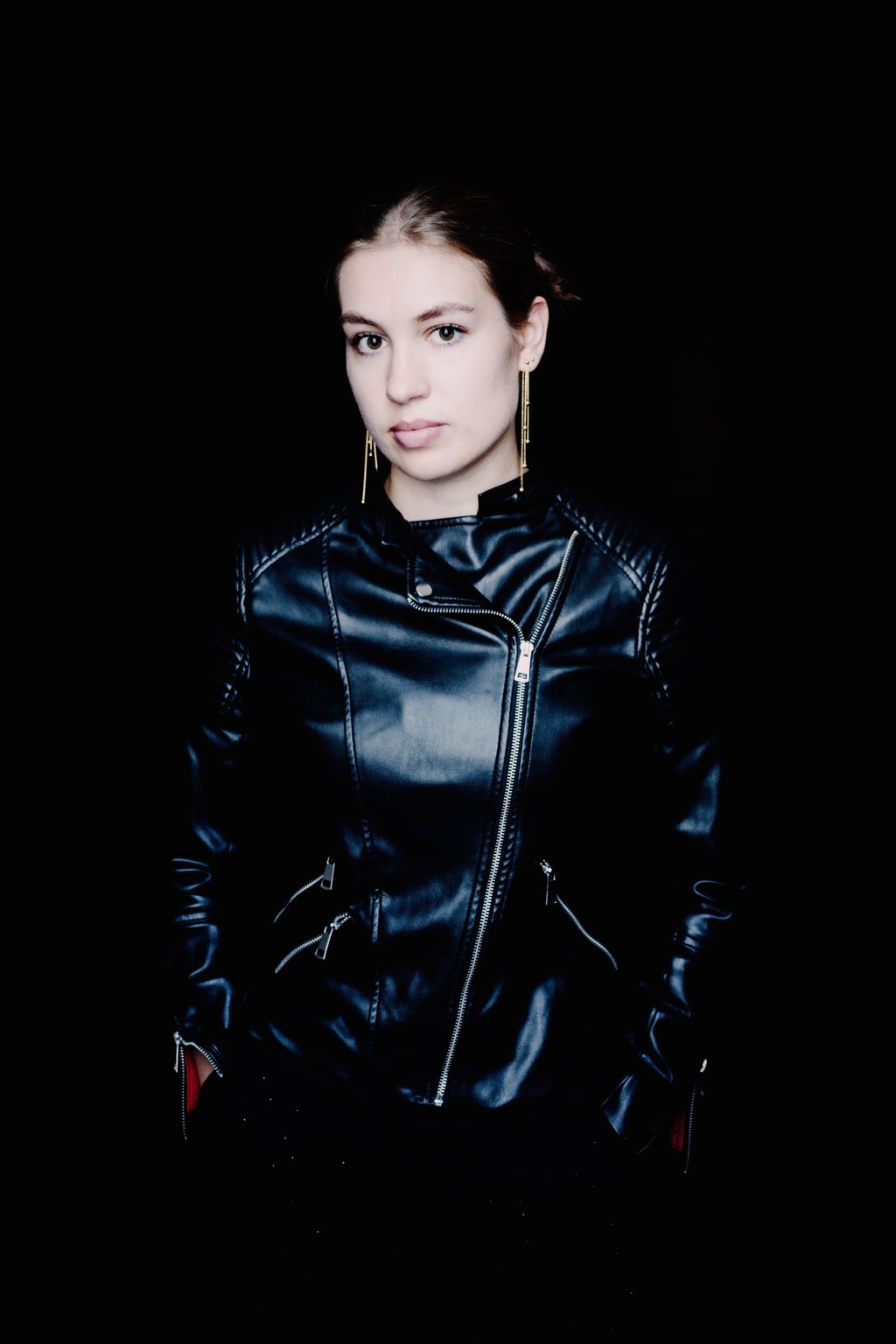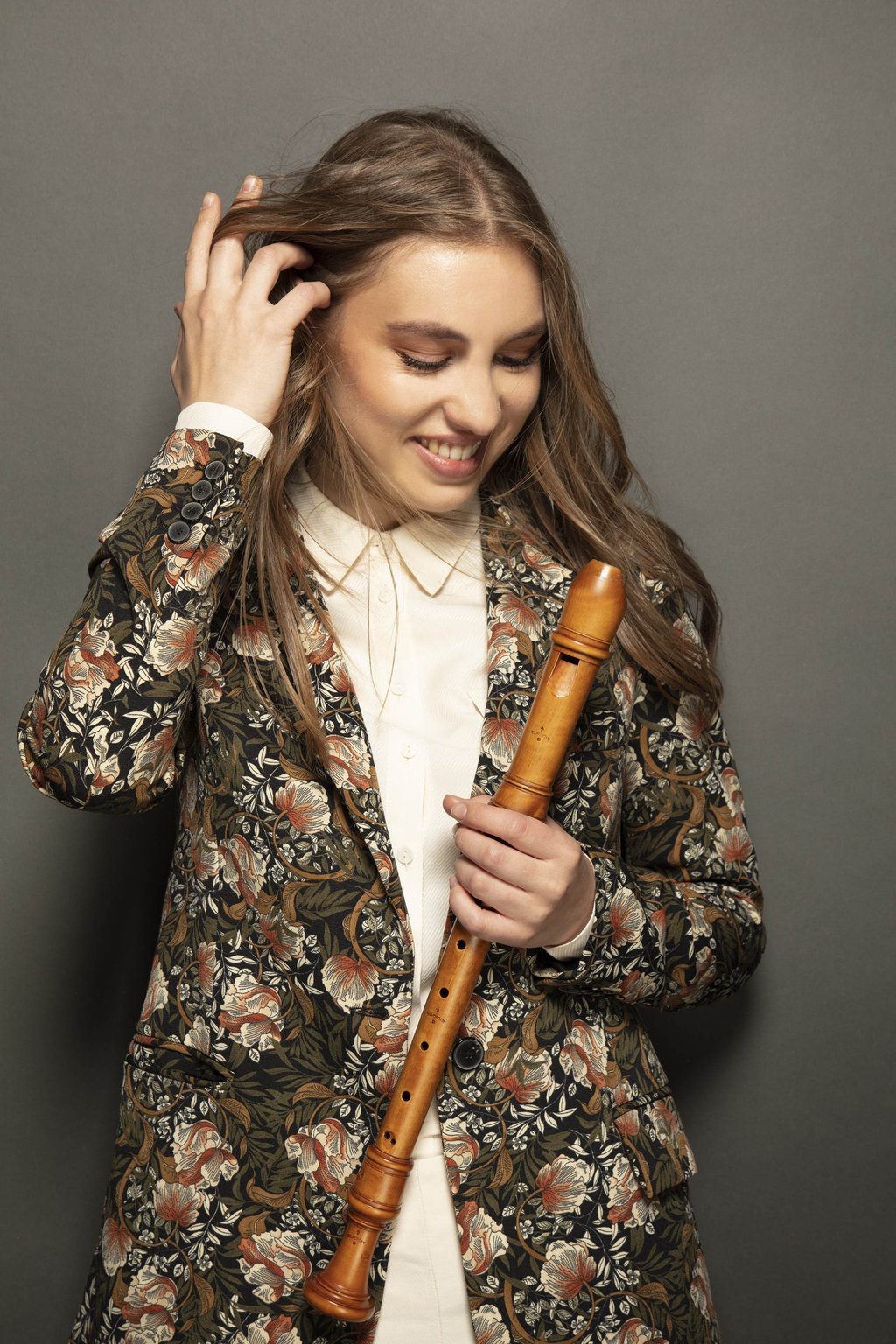Tue, Sep 30, 2025
Recorder player Lucie Horsch is appearing this month with the Concertgebouw Orchestra, playing among other things the premiere of a new piece written for her by Lotta Wennäkoski. She’s also been given carte blanche for a Close-up concert in the Recital Hall. And the recorder isn’t the only instrument she’s bringing to The Concertgebouw.
By Frederike Berntsen - This article was published (in Dutch) in Preludium, the magazine of the Concertgebouw Orchestra and The Concertgebouw.
A voice from the kitchen would call, ‘Play it slowly first!’’ Lucie Horsch is painting a picture of life at home. She comes from a musical family; both of her parents play cello and her brother plays violin. ‘Playing in tune, good tone, those are main topics of conversation at home. That good tone is a healthy thing, and when you need to use vibrato it should be balanced. A sound touches you immediately. It causes a physical reaction, so it has to be right.’
That ‘playing slowly’ is an issue. Lucie Horsch is quick by nature and has a broad range of interests. She did several programmes at the conservatoire: recorder, piano and singing, with minors in art history and Italian at the University of Amsterdam. ‘I once asked my piano teacher Jan Wijn, “I’m so impatient, what can I do about it, so I can use it in a positive way?” He answered, “You know, people who are that impatient also get results sooner. Impatience isn’t really so bad.’’
Red wine
If it sounds like her life is a perpetual rush hour, she says, ‘It used to be that way.’ As of last September, the Amsterdam-born Horsch’s student days are over. She’s finished the conservatoire, after first closing the doors of the Barlaeus Gymnasium. ‘Suddenly there were no deadlines, no tests, no papers – I felt completely at sea. Very gradually, I found a new equilibrium. Taking a day off works wonders; but at first I just couldn’t do it. That relaxation is really important in singing; I’ve noticed that my singing is coming along faster now.’ Horsch immediately adds: ‘I don’t want to become the kind of singer who can never relax with a glass of red wine.’ Asked if she’s currently living it up, without taking the demands of her profession into account, she answers, ‘Yeah, I’m living life to the fullest all right. I have enormous flexibility, but I also have willpower and a sense of responsibility. I don’t want to have anything imposed on me.’
Her father Gregor and her brother Caspar both play in the Concertgebouw Orchestra, the orchestra with whom she’ll be playing the world premiere of a piece written especially for her by Finnish composer Lotta Wennäkoski. ‘I have so much admiration for the Concertgebouw Orchestra. As a kid, I often would wait by the artist entrance until my father was done with rehearsal. At home I heard all the stories about the orchestra. Being able to play with these musicians myself feels like coming home.’
Wennäkoski for Horsch
The orchestra’s solo violist Michael Gieler introduced Horsch and Wennäkoski to each other years ago, and the click was immediate. They’ve already worked together several times, and now, at Horsch’s request, the new work is in progress. ‘At first I had to get used to Lotta’s idiom, and that had everything to do with the Finnish language. It’s such a different language family than what we’re used to. In Finnish, the accent is always on the first syllable, and that finds its way into the music. The rhythm of Lotta’s music is connected to her language.’
The new piece also has a vocal part, sung in French. Horsch is multi-talented, even if she brushes off descriptions like that straight away, saying she’s ‘just’ doing something she loves intensely: making music. While we may know her primarily as a recorder player, she performs more and more these days as a pianist and singer. ‘From age five to ten, my main instrument was the recorder, but at the same time I was also singing in the National Children’s Choir. Now that I’ve graduated in piano and voice, I’m starting to feel freer and freer about bringing these two instruments onto the stage as well. Lotta’s recorder concerto includes a part for voice, and I’m extremely excited to be taking on this challenge.’

Once I have a recorder in my hands, everything just falls into place.
Why does it click so well between her and this composer? ‘I think Lotta’s fascination with acoustic sounds is interesting. She starts with the apparent limitation of the recorder’s relatively soft sound, and uses it to create something remarkable, and without amplification. She writes expressively, there’s real life in the notes. The concerto has three movements, I know that much because every now and then I get a draft in my mailbox. Most of the singing is in the final movement. She introduces me as a virtuoso recorder player and has me look back at music history.’ That sounds like she has to walk on stage carrying a bunch of recorders. ‘Yes! Being a recorder player means having to change instruments, according to what the music calls for. Here you need a sopranino, the next moment a tenor. I switch between five different recorders in this concerto, and it’s something I don’t think about anymore. Once I have a recorder in my hands, everything just falls into place.’
Close
Besides the world premiere in the Main Hall, Horsch has put together a Close-up chamber-music concert in the Recital Hall, which also includes work by Wennäkoski. The ensemble of Concertgebouw Orchestra musicians playing in this concert includes her brother Caspar. ‘I’m very direct with my family when we play together. We know each other so well. Sometimes I have to hold it in when we’re playing with other people. You can’t just blurt out, “Could you just for once play in time?” Playing together is easy for us. We’ve all grown up together in the same house, we’ve heard each other practicing, and we know everyone’s sound and timing. A musical family is intense, everyone does what they feel from their hearts and they do it with feeling. I’m always very critical about baroque music, and I can be harsh too. I’ll tell my own parents, “You mustn’t ever play it that way.” I’ve always been fairly blunt.
‘No one in the family ever told us that we had to play music. My parents were always very conscious about that. My father felt he could have gone in some different directions himself, or that his parents could have encouraged him to do that more. I wanted to be a writer for a long time. It would be wonderful to create something, out of your own thoughts, preferably in a beautiful place where you felt freer about writing. Or working in a bookshop, talking with customers about the latest books, and reading a lot – fabulous.’
Spotlights
Horsch’s career is flourishing, with a full diary, concerts in the Netherlands and abroad, with renowned musicians as colleagues. Does she like being in the spotlights, or is it mainly about sharing the music? ‘I think the latter, but I don’t mind the interest from the public. The crazy thing is that I don’t experience that at all in my daily life. If I were working in a branch of music where success meant that people recognised me on the street, I’d consider giving up that career. It would be a huge invasion of my privacy. I used to enjoy just being on stage, because the grownups would stop talking and they’d listen to me. I might be an unpleasant person to be around if I couldn’t express myself on stage with music. I love the peaks, the adrenaline. But I have absolutely no desire to go to a theme park and ride the roller-coaster or anything. I’m not adventurous in my normal life, unless you count horseback riding.’

For me, the essence of making music is communication.
Researcher in the hall
Horsch also tries to find time to sit in the hall as a listener, something she considers a must. During last May’s Mahler Festival, we ran into her at a song recital in the Recital Hall. A day later, she was in the anteroom of the Main Hall, waiting to shake András Schiff’s hand after he’d finished Schumann’s Piano Concerto. ‘I also enjoy film music, soundtracks like Harry Potter. When I go to concerts, I try not to be dogmatic in my choices, and I try to go to programmes that might not appeal to me at first glance. I learn a lot from watching and listening to other people. I want to know why something doesn’t work, or why something appeals to the audience. I’m a researcher when I go to concerts.’
What does she think about when she’s playing music with other people? ‘I think it’s important to be kind, both in ensembles and in life. And I try to listen carefully, and to learn from other people. I look for that too, and I challenge myself to work with people who work differently than I do, who have a different background. That’s very inspiring.
‘For me, the essence of making music is communication. The exchanging, the sharing, getting something to take on a new meaning for the audience. Most of all I enjoy putting together programmes that include contemporary music. If I’m doing a baroque concert, I like to throw in some Isang Yun or Louis Andriessen. It’s exciting to think about being able to teach the repertoire we’re discovering in today’s commissioned works twenty years from now. Good composers work outside of the instrument’s limitations. They think from the perspective of their own musical language: what can I do with this instrument? It can be a surprise for the listener – I often hear comments like “I didn’t know you could do all that on a recorder.” But I do think that to be able to do something new that has any value, you have to be informed by history.’